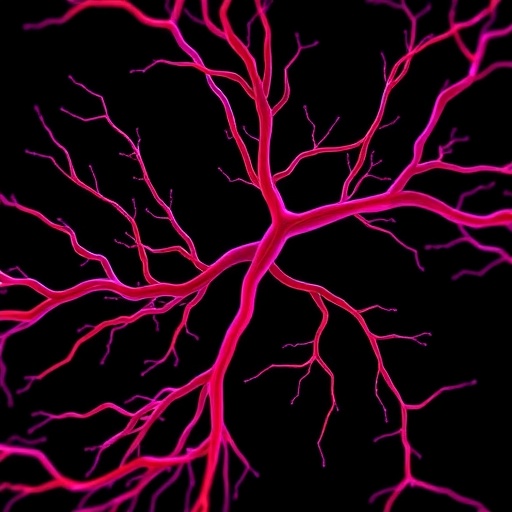A groundbreaking review article recently published in Genes & Diseases offers an intricate and expansive analysis of tumor angiogenesis, particularly emphasizing the enigmatic origins and multifaceted nature of endothelial cells (ECs) within the tumor microenvironment. Tumor angiogenesis, the process of new blood vessel formation, is fundamental to cancer progression, as it facilitates the unrestrained growth and metastasis of tumors by ensuring a continuous supply of oxygen and nutrients. This article thrusts into the limelight the highly heterogeneous and dynamic cellular landscape from which tumor endothelial cells arise, challenging long-held assumptions and opening new avenues for therapeutic innovation.
In a stark contrast to physiological angiogenesis, which follows a meticulously orchestrated program involving sprouting and maturation of blood vessels, tumor angiogenesis is profoundly chaotic and disorganized. The review elucidates that the endothelial cells populating the tumor vasculature emanate not only from pre-existing adjacent blood vessels but also from an array of unexpected progenitor sources. Bone marrow-derived endothelial progenitor cells (EPCs) can home to tumor sites and differentiate into functional vascular endothelium, contributing to aberrant vessel formation. Moreover, the startling plasticity of cancer stem cells, capable of transdifferentiating into endothelial-like cells, adds another layer of complexity to the tumor vascular milieu.
Beyond the classical endothelial lineage, the review highlights emerging evidence of transdifferentiation events involving non-endothelial cellular players within the tumor microenvironment. Cancer-associated fibroblasts (CAFs), widely recognized for their roles in matrix remodeling and signaling, exhibit potential to assume endothelial characteristics under hypoxic conditions. Similarly, immature dendritic cells, traditionally considered immune sentinels, may transdifferentiate into endothelial-like cells, further amplifying vascular heterogeneity. These revelations underscore a fundamental deviation in tumor vasculature genesis, emphasizing the plasticity and adaptability of cellular constituents under pathological stimuli.
One of the most formidable barriers to successful vascular-targeted therapies lies in the intrinsic heterogeneity and adaptability of tumor blood vessels. Unlike structurally and functionally stable vessels in normal tissue, tumor blood vessels are irregular, leaky, and structurally aberrant. The review carefully dissects the molecular underpinnings that orchestrate this disarray, particularly how dysregulated signaling pathways influence endothelial cell behavior. The vascular endothelial growth factor (VEGF) family remains a centerpiece in angiogenic signaling; however, the interplay with platelet-derived growth factor (PDGF), fibroblast growth factor (FGF), and the angiopoietin-Tie2 axis creates a signaling network that is both redundant and capable of compensatory activation when targeted therapeutically.
Therapeutic attempts to inhibit tumor angiogenesis, primarily through anti-VEGF agents, have been met with variable and frequently transient success. The review discusses the mechanisms militant tumors employ to circumvent angiogenic blockade. Adaptive angiogenesis enables tumors to activate alternative pro-angiogenic pathways, effectively sidestepping VEGF inhibition. Genetic heterogeneity among tumor endothelial cells fosters a subset of resistant phenotypes that survive therapeutic pressure, sustaining neovascularization. This evolving resistance not only diminishes the efficacy of current anti-angiogenic drugs but also encourages more aggressive tumor behavior, necessitating a paradigm shift in vascular-targeted cancer therapies.
In light of these challenges, the review argues for the urgent development of more nuanced, multi-targeted therapeutic strategies. It advocates focusing on the diverse cellular origins of tumor endothelium and the molecular redundancy of angiogenic signaling pathways. Targeting the bone marrow-derived EPCs alongside local endothelial cells, modulating cancer stem cell plasticity, and intercepting transdifferentiation events stand as promising frontiers. Such approaches could effectively disrupt the vascular support system of tumors, impairing their growth and metastatic potential.
The molecular complexity of signaling in tumor angiogenesis, including VEGF, PDGF, FGF, and angiopoietin/Tie2 systems, serves not only to promote vessel growth but also to regulate vessel stability, permeability, and interaction with perivascular cells. The review elaborates on how alterations in these pathways influence tumor vascular phenotypes and how their differential expression across tumor types and stages complicates treatment. This intricate signaling milieu requires tailored interventions that can simultaneously address multiple signaling nodes to prevent compensatory mechanisms.
Importantly, the article delves into the hypoxic microenvironment typical of solid tumors, which acts as a pivotal driver in vessel formation and endothelial cell origin specification. Hypoxia-inducible factors (HIFs) activate transcriptional programs that not only upregulate VEGF but also modulate the recruitment and differentiation of diverse endothelial progenitors and supporting stromal cells. This hypoxia-induced plasticity and cell lineage flexibility present both challenges and targets for disrupting tumor vascularization.
Moreover, the review accentuates the ecological interplay between tumor cells, stromal constituents, and immune components in shaping the tumor vasculature. This bidirectional communication influences endothelial cell phenotype and function, contributing to the anomalous architecture of tumor arteries and capillaries. It sheds light on how immune cell-derived cytokines and growth factors can potentiate angiogenesis or, under certain contexts, inhibit it, outlining the complexity of immune-vascular crosstalk in cancer.
By integrating recent discoveries in endothelial cell biology and tumor physiology, the article sets a foundation for the future of anti-angiogenic therapy that is both precise and dynamic. Moving beyond the conventional monotherapies, it suggests combination regimens that concurrently target multiple cell populations and signaling pathways, potentially overcoming the formidable challenge of therapeutic resistance and tumor adaptability.
Ultimately, this comprehensive review in Genes & Diseases offers an unprecedented lens through which to view tumor angiogenesis—not simply as aberrant vessel growth but as a multifactorial, highly plastic process involving a mosaic of cellular contributors and intricate signaling networks. It brings hope that unraveling these complexities will catalyze the design of next-generation therapies capable of more effectively starving tumors and mitigating metastatic spread.
As the field advances, the translation of these insights into clinical strategies will depend on continued interdisciplinary research combining molecular biology, oncology, pharmacology, and immunology. Understanding the origins and mechanisms of tumor endothelial cells is no longer a question of curiosity—it is a vital frontier in the war against cancer.
Subject of Research: Tumor angiogenesis and endothelial cell origins
Article Title: Endothelial cell in tumor angiogenesis: Origins, mechanisms, and therapeutic implication
News Publication Date: November 1, 2025
Image Credits: Genes & Diseases
Keywords: Cancer genetics, tumor angiogenesis, endothelial cells, vascular endothelial growth factor, cancer stem cells, bone marrow-derived endothelial progenitor cells, anti-angiogenic therapy, drug resistance, hypoxia, molecular signaling pathways




